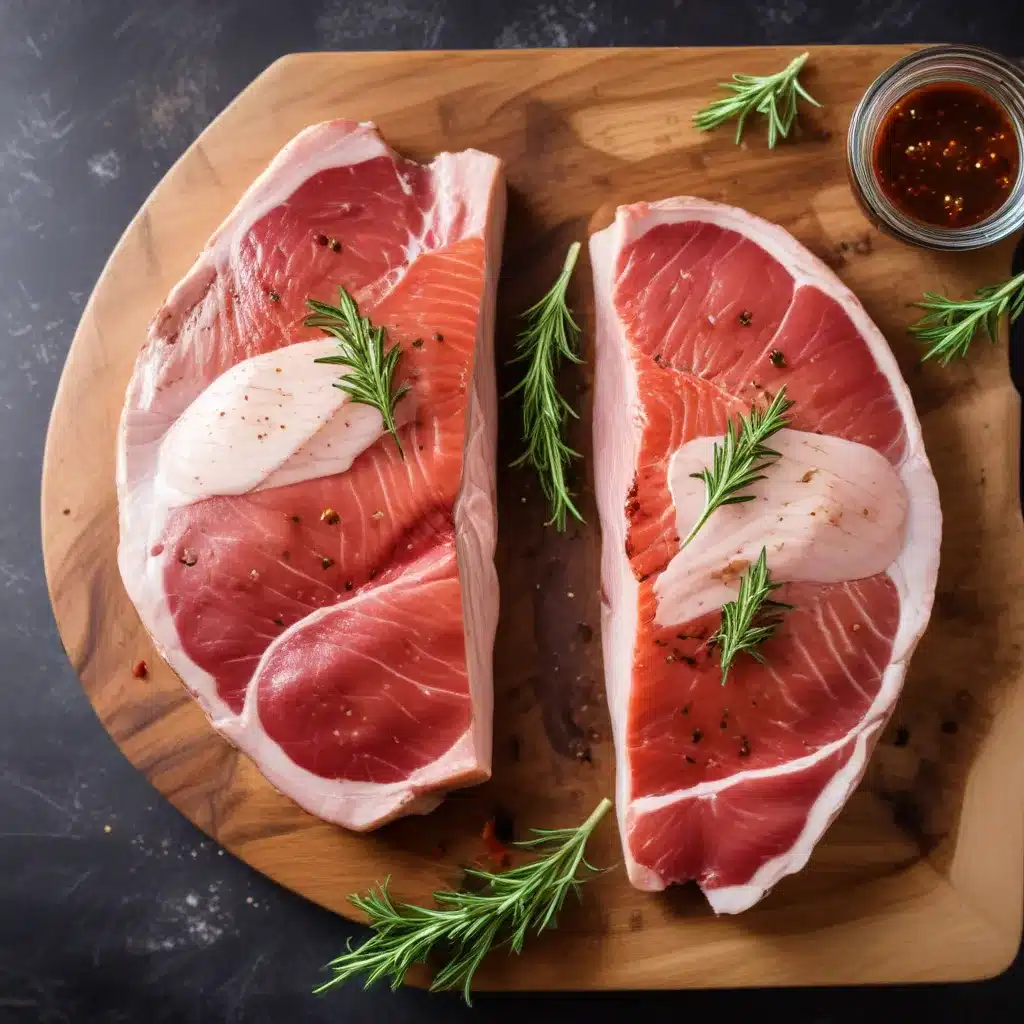
Unlocking the Secrets of Marinades
Marinades are a cornerstone of culinary alchemy, transforming even the most humble proteins into gastronomic masterpieces. As seasoned culinary professionals, we understand that the science behind marination holds the key to unlocking unparalleled flavors and textures. In this comprehensive guide, we’ll delve into the intricacies of marinade chemistry, exploring how various ingredients work in harmony to enhance your dishes.
The Brining Effect: Seasoning from the Inside Out
At the heart of a successful marinade lies the humble salt. Acting as a powerful brine, the salt in a marinade penetrates the meat, seasoning it from the inside out. This process, known as osmosis, allows the salt to dissolve proteins within the muscle tissue, causing them to contract less during cooking. As a result, the meat retains more moisture, delivering a juicier and more tender final product.
The optimal marination time for this brining effect generally falls between one to eight hours, depending on the thickness and density of the protein. While longer marination times can yield deeper seasoning and improved moisture retention, it’s crucial to keep an eye on the clock, as over-marinating can lead to a gummy or crunchy texture, particularly in delicate proteins like chicken.
Flavor Enhancement: A Surface Treatment
Beyond the brining effect, marinades also serve as a surface treatment, adding a cascade of flavors that bloom during cooking. The incorporation of ingredients like sugar, aromatics, and spices into the marinade introduces a wealth of flavor molecules that interact with the meat’s exterior.
As the meat is cooked over high heat, whether on the grill, in a hot oven, or in a searing pan, these surface-level flavors undergo a series of transformative reactions, such as the Maillard reaction and caramelization. This process unlocks a symphony of complex, nuanced flavors that simply can’t be achieved without the marinade.
However, it’s important to note that the penetration of these larger, more complex flavor molecules is limited, often only reaching the first few millimeters of the meat’s surface. This means that, while marinades can dramatically enhance the exterior of a dish, they are not a reliable method for infusing flavor into the interior of proteins.
Tenderizing Proteins: Acids, Bases, and Enzymes
Marinades can also play a crucial role in tenderizing proteins, but the approach requires a delicate balance. Certain ingredients, such as acids, bases, and enzymes, can alter the structure and texture of the meat, either for better or for worse.
Acids: Acidic ingredients like vinegar, citrus juice, or yogurt can help break down tough connective tissues, resulting in a more tender texture. However, excessive or prolonged exposure to strong acids can lead to a mushy, unpleasant exterior.
Bases: Conversely, alkaline ingredients like baking soda can increase the pH of the marinade, helping proteins retain more water and resulting in a more tender, juicy final product. But overuse of these bases can impart an undesirable metallic or ammonia-like flavor.
Enzymes: Enzymes like bromelain from pineapple or papain from papaya can effectively tenderize proteins by breaking down their complex structures. However, these powerful tenderizers must be used with caution, as they can quickly turn the meat into an unpalatable mush if left to work for too long.
By understanding the unique properties of these different tenderizing agents, you can carefully balance their use in your marinades to achieve the perfect texture every time.
Marinade Penetration: Size and Charge Matter
When it comes to infusing flavor beyond the surface, the size and charge of the marinade’s molecules play a crucial role. Smaller, more polar molecules, such as salt and MSG, tend to penetrate the meat more effectively, as they can more easily pass through the semipermeable membrane of the muscle tissue.
In contrast, larger, non-polar molecules like sugar, black pepper, and cumin struggle to make their way deeper into the protein. This explains why, despite the allure of complex marinades, the true seasoning power often lies in the humble salt.
The Role of Fat in Flavor Transfer
While it’s a common belief that fat can carry flavor deeper into meat, our experiments have shown that this is not the case. Fats, being large, non-polar molecules, simply do not have the ability to transport flavor molecules into the interior of the protein.
However, that’s not to say that fats don’t play a crucial role in marinades. By coating the surface of the meat, they help to conduct heat, prevent sticking, and deliver those surface-level flavors that bloom during cooking. But for those seeking to infuse flavor into the core of their proteins, relying on fat alone is not the solution.
Navigating the Marinade Landscape
With all this scientific knowledge in hand, how do you navigate the world of marinades and unlock their full potential? The key is to strike a balance between the various elements at play:
- Salt: Recognize the importance of salt as the foundation of a successful marinade, ensuring it can effectively penetrate the meat.
- Aromatics and Spices: Incorporate these flavor-packed ingredients, knowing that their impact will be largely limited to the exterior.
- Acids, Bases, and Enzymes: Use these tenderizing agents judiciously, adjusting concentration and marination time to achieve the desired texture.
- Timing: Pay close attention to the marination window, as over-marinating can quickly lead to undesirable results.
By understanding the underlying science and applying these principles, you’ll be well on your way to creating marinades that unlock the full potential of your proteins, delivering unparalleled flavor and texture in every bite.
So, the next time you’re ready to take your cooking to new heights, remember the secrets of marination and let the science guide you to culinary excellence. Visit Kitchen Warrior for more in-depth guides, practical tips, and inspiring recipes that will transform your kitchen into a true warrior’s domain.



